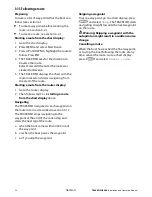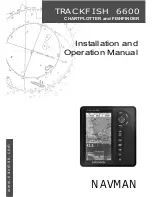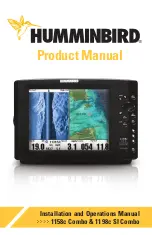
TRACKFISH 6500
Installation and Operation Manual
31
NAVMAN
The satellite display has information about the
GPS satellites and GPS position.
To go to the satellite display, press
,
select
Other
,
then select
Satellite
.
The satellite display shows:
7-1 Satellite display
A
C
D
B
E
G
F
A Status of GPS antenna, for example
Acquiring
,
GPS fix
,
No GPS
.
If
the unit is in Simulate mode it displays
Simulate
(see section 2-6).
B Time and date from GPS satellites. Time is
local time (UTC [GMT] plus local offset, see
section 17-12)
C HDOP: The error in the GPS position caused
by satellite geometry. A low value indicates
a more precise fix, a high value a less
precise fix
D Signal strengths of up to twelve visible GPS
satellites. The higher the bar the stronger
the signal
E Boat position
F Positions of visible GPS satellites:
Outer circle is horizon
Inner circle is 45° elevation
Centre is directly above
North is at top of display
G If the boat is moving, COG is a line from
centre
8 Sonar fishfinding: Introduction
Sonar functions require an optional sonar
transducer to be installed and set up.
This section explains how to interpret the sonar
displays, when and why to use the different
frequencies and how fish are detected and
displayed.
It also describes Gain and Range and shows
examples of some of the different sonar
displays.
8-1 Using the TRACKFISH
The TRACKFISH uses a sonar transducer
attached to the hull. The transducer generates
an ultrasonic pulse (sound that is above the
hearing range of the human ear), which travels
down towards the bottom at a speed of about
4800 ft/sec (1463 m/sec), spreading out into a
cone shape.
When the pulse meets an object, such as a
fish or the bottom, it is partly reflected back
up towards the boat as an echo. The depth
of the object or bottom is calculated by the
TRACKFISH by measuring the time taken
between sending a pulse and receiving the
echo. When an echo has been returned, the
next pulse is sent.
The TRACKFISH converts each echo into an
electronic signal, displayed as a vertical line
of pixels. The most recent echo appears on
the extreme right of the display, with the
older echoes being scrolled towards the left,
eventually disappearing off the display.
































